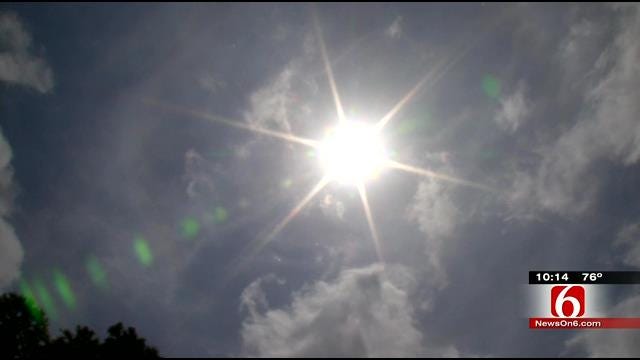Steps To Preventing Heat Stroke Essential During Oklahoma Summers
<p>All of us are susceptible to heat stroke, and EMSA paramedics responded to more than 800 heat stress-related calls in the Tulsa area in just the past three-and-a-half years.</p>Monday, August 11th 2014, 11:30 pm
Travis Meyer & Loren Cosby - News On 6
TULSA, Oklahoma - School is starting again which means football players are practicing and band students are marching in what could become some of the hottest weather of the year.
All of us are susceptible to heat stroke, and EMSA paramedics responded to more than 800 heat stress-related calls in the Tulsa area in just the past three-and-a-half years.
Statewide nearly 50 Oklahomans died of heat stroke in that same time.
News On 6’s own, Chief Meteorologist Travis Meyer said, what seems like a typical summer day can quickly turn into a struggle for survival.
Take Precaution Against Heat Stroke
Stephanie Wilburn is 17, and like many girls her age, she’s full of energy and, outwardly, the picture of health, but during a routine two-a-day softball practice three summers ago, something went wrong.
"About an hour-and-a-half into practice I started feeling really, unusually tired. And I was like, ‘no, I need to push through, I need to be strong,’" Wilburn said.
Pushing through her exhaustion in the triple-digit temperatures and high humidity, her condition grew more serious.
"The next thing I knew, I was in the dugout and my coaches were trying to make sure I was OK and I knew I was hydrated so that wasn't the problem,” she said.
It's the beginning of a heat stroke, the most serious, and often deadly, heat illness.
"I'd stopped sweating at that point,” said Wilburn. “Gone pale or gray in the face and it just went downhill from there. The ambulance had to come and give me electrolytes through the I.V., and it was not a great deal."
It took weeks for Stephanie to recover, and now her life is different. Her tolerance for heat is drastically lower and she is susceptible to relapse into heat-related illness.
"To this day I still have problems handling the heat, whether on the field or even walking from building to building during severe hot, humid heat,” Wilburn said.
While staying hydrated is vital, it certainly won't make you invincible from the intense summer heat, whether you're a competitive athlete on the field getting an outdoor workout, just enjoying a neighborhood park or working in the heat, you have to listen to your body for the signs of stress.
What you wear is also extremely important; if you wear something that's black, that adds 30 degrees to your core body temperature, something blue adds about 15 degrees, but if you wear something white, zero to five degrees is added.
As head trainer at Union High School, Dan Newman's job is to watch over hundreds of athletes.
"Heat cramps are kind of that precursor to everything. Your calves will start to cramp, maybe the quads,” Newman said.
He's always looking for the signs of heat exhaustion or heat stroke.
"You're going to start feeling a little dizzy, nauseous. You can't focus on anything, blurred vision, and that's what we'll look for, kids stumbling around, just not being able to keep up,” he said.
While most know water is important, few realize food's importance. Coming to practice or working in the heat without eating a meal, low in salt, beforehand can lead to the heat stress symptoms faster.
Acclimating to the heat is vital as well. When it becomes necessary to practice in brutal temperatures, Newman has some advice for the Union Football team, “When it's 110, just walk the block so your body gets used to that heat. Don't sit inside and play the Xbox all day."
He also urges other coaches to not push their players too hard.
"Gone are those days where you hold water back," he said.
The same goes for rest breaks during practice. Newman uses an instrument known as a Kestrel to take pre-practice, during-practice, and post-practice measurements of the environment.
Heat Index values are logged and used to determine the amount of heat stress the players could face.
If someone really struggles with the heat, coaches can even use a special pill that a player swallows with a remote device that can measure the core temperature of that player. It sounds like science fiction, but it’s another tool that can be used to prevent a heat stroke.
For Wilburn, unfortunately it's too late, but she’s now sharing her story with schools and groups across Green County to help raise awareness.
"I'm 17, and I know, sadly, I'm going to have the effects of heat exhaustion and heat strokes the rest of my life,” she said.
The very young and the old are most at risk, also people who work outside and those not used to being outside.
If you have high blood pressure, a heart condition or you take water pills, you're likely to be more sensitive to heat exposure.
More Like This
August 11th, 2014
September 29th, 2024
September 17th, 2024
Top Headlines
December 13th, 2024
December 13th, 2024
December 13th, 2024












